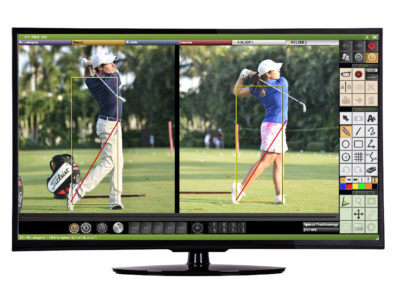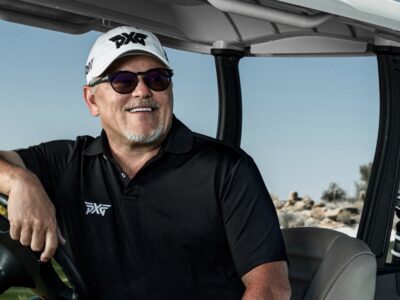By Len Ziehm
Several years ago, while on a vacation in Florida with his family, Mark Stewart, from Great Britain, was still a teen-ager, but with encouragement from his father and grandfather, he began thinking about golf bag designs.
“When we got home I was just curious. We developed prototypes on and off for about three years.’’
Stewart went on to earn an engineering degree from Loughbrough University and his curiosity expanded beyond just golf bags. He focused on developing what the British call electric “golf trolleys.’’
“We wanted something remote-controlled, because there were some out there at the time, but they had trouble with balance and stability, plus the steering wasn’t very good.’’
In 2003 Stewart Golf was launched and the following year its X1 Remote model was on the market. Even in America golf courses and players were very receptive the new carts.
“There was nothing controversial about it, ours just looked different. Trolleys were a huge advantage for playing, but there was a stigma attached to it. They were just for old guys who had a bad knee or some other disability. We were looking for amateur golfers walking the fairways, and if we could make it look different we had a chance.’’
That chance paid off. Stewart Golf has now sold its products in 50 countries. The first sales in the United States were made in 2008, and they’ve since reached every state except Hawaii and Alaska.
Initially golfers could strap their bags to Stewart Golf’s “trolley’’ and then enjoy their walks around the course without carrying their clubs. The bags could move with remote commands that a golfer would make with a hand-held device and could be attached to a belt, or in a pocket.
Business really took off in 2015 when the “follow’’ system was launched, which made it possible for the bag to follow the golfer, much like a human caddie would.
“It was a big change in our business, because it took us to another level. It was not just eye-catching, but it was fun to watch something following someone down a fairway.’’
The present version, called the Q Follow, has a futuristic look as it follows automatically down the fairway with full remote-controlled functionality. The golfer can putt out on a green, then remotely guide the trolley to the next tee without walking back to his bag.
Stewart Golf took a huge financial gamble by introducing the electric caddies at the 2015 PGA Merchandise Show.
“Everyone told us that no one walks in America. In the U.K. 98 percent of golfers walk. I’d be surprised if it was more than 20 percent in the United States. Our mission statement as a company is to show people a different way to play golf. The experience of walking a golf course is like nothing else. You get the exercise of walking, plus actually talking with your playing companions.’’
What the company found in America is that golfers will walk if they have the right incentive. Americans love their toys too.
“Our business in America is four times what it was in 2019. That’s why it’s now our biggest market, followed by the U.K. and Canada. People were forced to walk during COVID and our demand went up.’’
In the United States, Stewart Golf’s products are called “Electric Caddies’’ rather than “trolleys.’’ They are made at a factory in Gloucester, a two-hour drive from London. For their American operations, they also have a warehouse in Clearwater, Florida.
“Electric Caddies’’ have one big advantage that might not be obvious, they aren’t affected by “Cart Path Only’’ restrictions, which also improves pace of play.
Stewart Golf products can be easily purchased online, with a retail cost of approximately $2,500.00. Various models and colors are available to match your car, golf club bag, or personal preference.
“Continually learning and gaining experience, we










